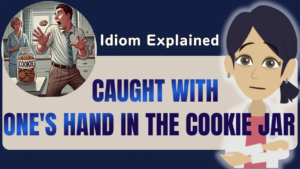Ever accidentally revealed a secret and watched someone’s face fall in disappointment? You’ve just spilled the beans!
To reveal a secret or disclose confidential information, often unintentionally.
Welcome to our exploration of this colorful English idiom!

While it may conjure images of a kitchen mishap, “spill the beans” has nothing to do with actual beans.
By understanding its true meaning, history, and everyday usage, you’ll enhance your English fluency and cultural awareness. This expression adds vibrancy to conversations and helps you communicate more naturally with native speakers.
Ready to discover how this phrase can enrich your vocabulary and help you navigate social situations with confidence? Let’s dive in!
Idioms in Daily Communication
Using idioms effectively can make your English sound more lively and natural.
Native speakers sprinkle these expressions into daily conversation without a second thought, and to truly connect with them on a cultural and linguistic level, it’s important to understand how these phrases function.
Idioms often provide vivid imagery or humor, allowing you to speak more engagingly and colorfully.
Beyond just sounding more natural, learning idioms such as “spill the beans” has deeper benefits:
- Enhancing Fluency: When you recognize and use idioms correctly, you show that you have a nuanced grasp of the language.
- Cultural Connection: Many idioms carry cultural references or historical origins that can help you relate more intimately to the traditions and stories behind the expressions.
- Confidence in Conversations: Mastering idioms often boosts your self-assurance when speaking or listening, as you’ll be less likely to feel lost when these phrases pop up.
By discovering how to use “spill the beans” in everyday contexts, you’ll expand your communication toolkit.
Instead of using literal translations or feeling puzzled by an unfamiliar phrase, you’ll be able to respond smoothly and participate more fully in the conversation.
Understanding “Spill the Beans”
The idiom “spill the beans” means to reveal a secret or disclose confidential information, often unintentionally. It’s a short, catchy way of saying, “Hey, you gave away the surprise!” or “You let slip something that was supposed to remain hidden.”
Despite the literal mental image of beans tumbling across a kitchen floor, you’re not actually talking about any physical beans.
Why This Idiom Matters
- Frequent Usage: You’ll encounter “spill the beans” in social gatherings, workplaces, or even casual chatter among friends. Recognizing it helps you stay engaged and avoid misunderstandings.
- Expressiveness: Using this idiom livens up your speech. Rather than saying, “I accidentally told the secret,” you can say, “I spilled the beans,” giving your language a more authentic feel.
- Cultural Reference: This phrase adds flavor to conversations and reflects an aspect of English-speaking culture that embraces colorful expressions.
Common Contexts for “Spill the Beans”
While “spill the beans” can appear in nearly any conversational scenario, there are a few particularly common contexts:
- Casual Conversations: When someone unintentionally blurts out a secret, such as a friend revealing a surprise party location without realizing the guest of honor is present.
- Workplace Settings: Accidentally disclosing sensitive details about a new project or future plans that haven’t been officially announced.
- Family Gatherings: Revealing a surprise trip, a plan, or other confidential information that was supposed to remain hush-hush.
Examples in Sentences
Here are some sentences that demonstrate how to use “spill the beans”:
- “I accidentally spilled the beans about the surprise party to my colleague.”
This indicates that you let your colleague know about a party that was meant to be a secret. - “Please don’t spill the beans about the new product; we’re waiting for the official launch.”
You’re asking someone not to reveal confidential details before the appointed time. - “She spilled the beans regarding the engagement before the couple could announce it themselves.”
This expresses that someone else disclosed romantic news, potentially ruining the big reveal. - “I didn’t mean to spill the beans, but I was so excited that I told everyone about the award ceremony.”
This highlights an unintended revelation caused by enthusiasm. - “He spilled the beans on our vacation plans, so now everyone knows we’re going to the beach.”
This underscores that private travel plans are no longer private.
By using these phrases or understanding them when others do, you’ll navigate social and professional situations more gracefully.
Historical Origins
Many believe that “spill the beans” has roots in ancient customs, though there’s no definitive proof that one particular origin story is the sole source.
The expression has been widely recognized in English since the early 20th century, but let’s look at some of the popular theories that illustrate how it might have evolved.
The Ancient Greek Connection
One theory traces the phrase back to ancient Greece, where beans were used for voting. Voters would place beans in a container to cast their votes for or against a certain decision or candidate.
If someone knocked over or opened the container prematurely, it would literally “spill the beans,” revealing the votes before the official tally.
This error became a metaphor for revealing hidden information before the proper time.
A Visual Metaphor
Another possible explanation is simpler: tipping over a container of beans vividly exposes everything that was inside.
Whether or not it stemmed from an actual voting procedure, the image of accidentally exposing something hidden can stand on its own as a metaphor for letting secret information escape into the open.
Regardless of which story you prefer or find most convincing, the key takeaway is that “spill the beans” is all about inadvertently exposing information that was meant to remain concealed.
Using “Spill the Beans” in Practice
Understanding how to use “spill the beans” requires a grasp of both its meaning and the right scenarios in which to employ it. Below are a few practical applications you might encounter in daily life:
- Office Environment: Suppose you’re part of a small team working on a top-secret project. If you accidentally let the rest of the staff know about it during an informal chat, you’ve just spilled the beans.
- Surprise Events: Are you planning a secret birthday bash for a friend? If you casually mention party details in their presence, you’re giving the game away.
- Personal News: Imagine you discover a close relative’s engagement before they’ve told anyone. If you announce this news prematurely at a family dinner, you’ve spilled the beans.
By recognizing and practicing these examples, you’ll feel more comfortable using the idiom in your own conversations.
Real-Life Consequences
It’s fun to learn a quirky expression like “spill the beans,” but there can be significant real-world fallout when sensitive information slips out unexpectedly.
In certain situations, the consequences can be lighthearted, while in others, they can be quite serious.
- Social Blunders: In a lighter scenario, you might reveal a surprise trip your friend planned, causing some embarrassed laughter. No lasting damage is done, but the element of surprise disappears.
- Professional Mishaps: In a more serious context, someone might inadvertently discuss a company’s confidential strategies. This can give competitors an advantage and possibly lead to major financial repercussions.
- Political Ramifications: Consider a politician’s aide who leaks key campaign points. The opposition can use this knowledge to adjust strategies, potentially affecting the outcome of an election.
In everyday life, the phrase “spill the beans” is often used humorously. It conjures images of an accidental confession, followed by exclamations of, “Oh no!”
But it also stands as a reminder that sharing sensitive information at the wrong time can have real impact. As you practice English, keep this idiom in mind whenever secrecy is at stake.
Additional Anecdotes
Learning idioms can sometimes lead to comical misunderstandings, especially if you take them literally. Here are a few lighthearted anecdotes and tips to keep in mind:
- Dinner Party Confusion: You’re at a dinner party when someone whispers, “Don’t spill the beans about the promotion.” Thinking they refer to an actual dish, you start explaining your preferred method for cooking beans. In the resulting silence, you realize you just confessed a significant secret about someone’s promotion!
- Tip: If an idiom seems odd, double-check if it really means what you think it does. Cultural context is key.
- Tip: If an idiom seems odd, double-check if it really means what you think it does. Cultural context is key.
- Overenthusiasm: Sometimes excitement causes us to spill secrets. You might be so thrilled about a new film or an upcoming event that you let the cat out of the bag—another idiom for revealing secrets—without meaning to.
- Tip: If the topic is supposed to be confidential, remind yourself to pause before sharing details.
- Tip: If the topic is supposed to be confidential, remind yourself to pause before sharing details.
- Learning Through Laughter: Each time you slip up with an idiom, don’t be too hard on yourself. Misunderstandings can be stepping stones to deeper learning.
- Tip: Collect funny moments in a notebook. They will remind you of how far you’ve come and help you remember certain phrases.
Using Idioms in Language Practice
Expanding your vocabulary with idioms can dramatically improve your English fluency, but it’s crucial to do so in a way that feels natural. Here are some ways to integrate phrases like “spill the beans” into your routine:
- Active Listening: When you watch TV shows, listen to podcasts, or follow conversations in English, pay attention to idioms. When you hear “spill the beans,” note who said it and in what context.
- Practice Through Writing: Write short paragraphs or emails using new idioms. For example, recount a situation from your week and describe how someone nearly spilled the beans.
- Reading and Reviewing: Find an article or a book excerpt where characters reveal a secret. Reflect on how the situation could be described using “spill the beans.”
- Speaking Exercises: Try role-playing with friends who are also learning English. Set up scenarios where you have a secret, and see if you can navigate the conversation without spilling the beans.



Practice makes perfect! Regularly using idioms in your English will enrich your vocabulary AND deepen your cultural understanding. Keep it up!
Over time, these expressions will feel as natural as any other everyday phrase.
Pop Quiz: Check Your Idiom Skills
Spill the Beans

Conclusion
Idioms add an extra layer of flair, humor, and color to everyday English, making conversations more engaging and memorable. “Spill the beans” stands out as a fun yet cautionary phrase: it demonstrates how a lighthearted expression can carry serious weight in the wrong situation.
Whether you’re revealing a surprise party by mistake or accidentally disclosing a sensitive corporate secret, “spilling the beans” conveys the same message—someone has let crucial information slip.
By learning to use “spill the beans” in the right context, you’ll navigate both social and professional environments with more confidence. Remember, a good sense of humor can turn an embarrassing moment into a learning experience, and a bit of caution can save you from unwittingly exposing secrets.
Ultimately, the more you immerse yourself in idioms, the closer you’ll get to a fluent, culturally rich command of the English language.
So the next time you hear someone say, “Don’t spill the beans!” you’ll know exactly what they mean. You’ll be able to keep that secret safe—or at least avoid referencing your favorite chili recipe!









Comment